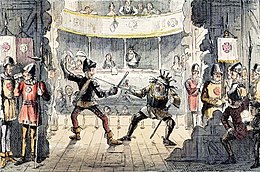
Drama Page 5
We found 80 free papers on Drama
Essay Examples
Post-Shakespearean Dramatists and declining of drama during post-Shakespeare period
Drama
William Shakespeare
Introduction Post Shakespearean drama/Jacobean drama (that is, the drama of the age of James 11603-1625) was a decadent form of the drama of Shakespeare and his contemporaries. The Elizabethan age was the golden age of English drama.With the turn of the century the drama in England also took a turn. It does not mean that…
Max Stafford-Clark and His Rehearsal Techniques Character Analysis
Drama
Stafford-Clark is one of the most influential directors to embrace British Theatre in the past 40 years. Nearly every play Max has directed is political, including themes such as Marxism (like Brecht), socialism, feminism, poverty and many more political themes. Max says he chooses to direct plays like this because “I am socially curious, and…
Othello: The Dramatic Impact Of Act 1 Scene 3 And Its Importance To The Play As A Whole Analysis
Drama
Othello
‘Othello’ is a classic play written by William Shakespeare in the 17th century. The play is about evil, betrayal, trust and demonstrates the society of the time. It also has a classic tragic ending much like ‘Romeo and Juliet’. The main character is Othello, the only black character in the play. Desdemona, a white woman,…
Dramatic Irony in Othello
Drama
Othello
One of the prominent elements in Othello is the use of dramatic irony, particularly in Iago’s dialogues. This technique is prominently displayed when Iago tells outright lies to deceive other characters, portrays himself differently to manipulate others, and when other characters discuss him in a manner that misrepresents his true nature. Iago consistently fabricates small…
What is particularly dramatic about Act 4, Scene 3 of ‘Othello’? Analysis
Drama
Othello
“What is particularly dramatic about Act4, Scene 3 of ‘Othello’? Explore the relationship between the two women themselves and their relationships with their husbands here and elsewhere. Do you think Shakespeare himself is ‘putting down’ women or is he just portraying a male attitude of his time? ” Act 4 Scene 3 of ‘Othello’ is…
An analysis of dramatic elements in Oedipus the King and Hamlet
Drama
Elements
Hamlet
Oedipus
Aristotle wrote numerous treatises about a variety of topics, one of which is his treatise on Poetics. In this treatise, he discusses poetry and the construction of epics, but the treatise heavily focuses on the creation and definition of a tragedy, particularly on the development of the plot. Based on Aristotle’s definitions of a tragedy…
How Does Steinbeck Make the Fight Scene Dramatic in ‘of Mice and Men’
Drama
John Steinbeck
Of Mice and Men
The fight scene takes place in the barn where Lennie is looking at the new-born pups, and Curley ran into the barn with the impression that his wife was cheating on him with Slim. The scene is already made slightly dramatic by portraying Curley, who has previously been portrayed as a small thug, as a…
‘Teechers’ by John Godber Short Summary
Drama
Entertainment
Theatre
I will aim to write about the techniques and strategies used in ‘Teechers’ by John Godber and my own performance of the text that help my understanding and appreciation of the play. ‘Teechers’ is a school play performed by three students based on their new Drama Teacher and follows events that may or may not…
Outline and Discuss Erving Goffman’s Theory of Dramaturgy
Drama
According to Shakespeare’s As You Like It, every person in the world is like a player on a stage. They have entrances and exits and play many roles throughout their lives, which can be divided into seven ages. This idea of social interactions as performances before an audience is known as dramaturgy and was described…
Literary Analysis: a Doll House
Drama
Henrik Ibsen
Suffering
A Doll House is a play by Norwegian poet Henrik Ibsen. Ibsen devoted his entire life to the theater. Ibsen is said to have changed the history of the stage. Henrik Ibsen was born March 20, 1828, in Skien. Around 1851 Ibsen accepted the position of theater poet at the National Theater. He was there…

